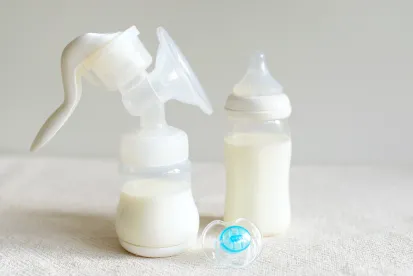Remedies for enforcement of the new federal Providing Urgent Maternal Protections for Nursing Mothers Act (PUMP Act), which requires most employers to provide both reasonable break time for employees to express milk for a nursing infant and private spaces to express milk, took effect on April 28, 2023.
Quick Hits
-
The PUMP Act extends protections for the right to express breast milk in the workplace for most employees through a nursing child’s first year after birth.
-
The act requires employers to provide “reasonable break time” and private space, other than a bathroom, to express breast milk.
-
Enforcement remedies took effect on April 28, 2023.
PUMP Act
President Biden signed the PUMP Act into law on December 29, 2022, as part of the Consolidated Appropriations Act, 2023. The law amends the Fair Labor Standards Act (FLSA) to extend the coverage of the right to express milk at work to nearly all workers covered by the FLSA. The law went into effect immediately after signing, but additional remedies for enforcement of the act’s protections took effect on April 28, 2023.
While some states and municipalities already provide employment protections for employees who need to express milk for nursing children, the PUMP Act provides protections under the FLSA on a nationwide basis. In January 2023, the U.S. Department of Labor (DOL) Wage and Hour Division updated its “Fact Sheet #73: FLSA Protections for Employees to Pump Breast Milk at Work” in light of the PUMP Act’s new protections. Below is an overview of the key parts of the law that employers may want to consider.
Covered Employees
The PUMP Act amends the FLSA to require employers to provide reasonable break time and private space, other than a bathroom, to express breast milk for a “nursing child for 1 year after the child’s birth.” The Affordable Care Act of 2010 (ACA) amended the FLSA to require employers to provide these protections to nonexempt employees. The PUMP Act extends the protections to nearly all employees covered by FLSA regardless of whether they are exempt from minimum wage and overtime requirements with the exception of certain employees of airlines, railroads, and motor coach carriers.
Employers are covered by the FLSA if they are engaged in interstate commerce, have at least two employees, and do at least $500,000 per year in business. Additionally, even if an employer is not covered, individual employees of that employer may be entitled to FLSA protections for expressing milk if they are engaged in interstate commerce.
Still, the PUMP Act contains an exemption for small employers, those with fewer than fifty employees, if compliance “would impose an undue hardship by causing the employer significant difficulty or expense when considered in relation to the size, financial resources, nature, or structure of the employer’s business.”
Break Time Requirements
The PUMP Act requires most employers to allow covered employees to take reasonable break time “each time such employee has need to express milk.” The Wage and Hour Division explained in its fact sheet that employers may not deny a covered employee needed break time during the first year of a nursing child’s life. The frequency and duration of such breaks will vary depending on factors specific to each employee and the nursing child.
Employers are generally not required to compensate nonexempt employees for reasonable break time, unless otherwise required by state or municipal law. However, the Wage and Hour Division noted in the fact sheet that under the FLSA, an employee must either be “completely relieved from duty” or paid for the break time. Where employers provide paid rest breaks, employees may use such time to express breast milk and the employees must be compensated the same as other employees for such break times.
Space Requirements
The act requires employers to provide such employees space to express breast milk that is: (1) not a bathroom, (2) “shielded from view,” and (3) “free from intrusion from coworkers and the public.” The Wage and Hour Division stressed in the fact sheet that “a bathroom, even if private, is not a permissible location for the employer to provide” to express breast milk.
While the PUMP Act does not provide specifics for what features or amenities are required in the space as some state and municipal laws have specified, the Wage and Hour Division has explained that the location must be “functional as a space for expressing breast milk,” and noted that a place to sit, a surface on which to place the pump, and access to electricity increases the functionality of the space. If not dedicated solely for that purpose, it “must be available when needed by the employee.” This can be a temporary space “made available when needed by the nursing employee” so long as it meets the other requirements. Employers may want to consider what space they could provide for these purposes, especially in nontraditional environments or those with limited space.
There is no cap on the distance the space must be within to the employee’s workspace, but the Wage and Hour Division in other communications has noted that it must not be so far based on the specific circumstances as to deny the employee reasonable access to take breaks as needed.
The PUMP Act also applies to remote employees. While the employer, of course, need not provide space in the employee’s home, those employees must be free from observation by any employer-provided or required video system, including a computer camera, security camera, or web conferencing platform during the time they are pumping.
Remedies
The PUMP Act’s provisions for remedies took effect on April 28, 2023. The law provides for legal or equitable remedies under the FLSA against employers that violate employees’ rights to reasonable break time and space to express breast milk. Available remedies include employment, reinstatement, promotion, the payment of lost wages or additional liquidated or compensatory damages, and make-whole relief for economic losses suffered as a result of a violation. According to the Wage and Hour Division’s fact sheet, remedies may even include “punitive damages where appropriate.”
If employers fail to provide a space meeting the requirements of the PUMP Act, employees must provide the employer with notice of the failure and provide the employer ten days to correct the issue prior to commencing an action.
Next Steps
Employers may want to review their workplace policies and allocation of space with consideration to the PUMP Act’s requirements to provide both reasonable break time as needed for employees to express milk for a nursing child and a space to express milk that is shielded from the view that is not a bathroom and is free from intrusion. The Wage and Hour Division has noted that this space does not have to be permanent, though it must be made available to employees when they need to express milk.
Employers may want to ensure managers and human resources professionals are trained on the requirements of the PUMP Act, as well as the Pregnant Workers Fairness Act (PWFA). Employers may also want to consider periodic check-ins with employees to ensure the breaks and pumping space are working well.
Further, the PUMP Act sets the floor, not the ceiling, and states and municipalities may enact greater protections. Employers may further want to review state and municipal law that may require employers to provide greater protections for employees to express milk, including requirements for lactation spaces to have certain amenities, such as a chair, electric outlets, and/or refrigeration.





 />i
/>i

